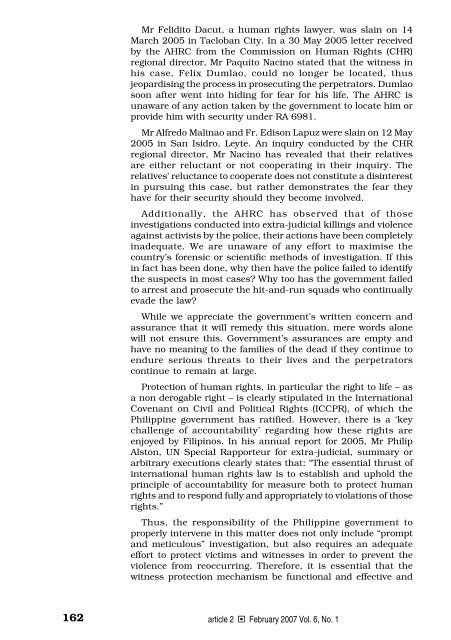of the Philippines the criminal justice system is - Article 2
of the Philippines the criminal justice system is - Article 2
of the Philippines the criminal justice system is - Article 2
You also want an ePaper? Increase the reach of your titles
YUMPU automatically turns print PDFs into web optimized ePapers that Google loves.
Mr Felidito Dacut, a human rights lawyer, was slain on 14<br />
March 2005 in Tacloban City. In a 30 May 2005 letter received<br />
by <strong>the</strong> AHRC from <strong>the</strong> Comm<strong>is</strong>sion on Human Rights (CHR)<br />
regional director, Mr Paquito Nacino stated that <strong>the</strong> witness in<br />
h<strong>is</strong> case, Felix Dumlao, could no longer be located, thus<br />
jeopard<strong>is</strong>ing <strong>the</strong> process in prosecuting <strong>the</strong> perpetrators. Dumlao<br />
soon after went into hiding for fear for h<strong>is</strong> life. The AHRC <strong>is</strong><br />
unaware <strong>of</strong> any action taken by <strong>the</strong> government to locate him or<br />
provide him with security under RA 6981.<br />
Mr Alfredo Malinao and Fr. Ed<strong>is</strong>on Lapuz were slain on 12 May<br />
2005 in San Isidro, Leyte. An inquiry conducted by <strong>the</strong> CHR<br />
regional director, Mr Nacino has revealed that <strong>the</strong>ir relatives<br />
are ei<strong>the</strong>r reluctant or not cooperating in <strong>the</strong>ir inquiry. The<br />
relatives’ reluctance to cooperate does not constitute a d<strong>is</strong>interest<br />
in pursuing th<strong>is</strong> case, but ra<strong>the</strong>r demonstrates <strong>the</strong> fear <strong>the</strong>y<br />
have for <strong>the</strong>ir security should <strong>the</strong>y become involved.<br />
Additionally, <strong>the</strong> AHRC has observed that <strong>of</strong> those<br />
investigations conducted into extra-judicial killings and violence<br />
against activ<strong>is</strong>ts by <strong>the</strong> police, <strong>the</strong>ir actions have been completely<br />
inadequate. We are unaware <strong>of</strong> any effort to maxim<strong>is</strong>e <strong>the</strong><br />
country’s forensic or scientific methods <strong>of</strong> investigation. If th<strong>is</strong><br />
in fact has been done, why <strong>the</strong>n have <strong>the</strong> police failed to identify<br />
<strong>the</strong> suspects in most cases? Why too has <strong>the</strong> government failed<br />
to arrest and prosecute <strong>the</strong> hit-and-run squads who continually<br />
evade <strong>the</strong> law?<br />
While we appreciate <strong>the</strong> government’s written concern and<br />
assurance that it will remedy th<strong>is</strong> situation, mere words alone<br />
will not ensure th<strong>is</strong>. Government’s assurances are empty and<br />
have no meaning to <strong>the</strong> families <strong>of</strong> <strong>the</strong> dead if <strong>the</strong>y continue to<br />
endure serious threats to <strong>the</strong>ir lives and <strong>the</strong> perpetrators<br />
continue to remain at large.<br />
Protection <strong>of</strong> human rights, in particular <strong>the</strong> right to life – as<br />
a non derogable right – <strong>is</strong> clearly stipulated in <strong>the</strong> International<br />
Covenant on Civil and Political Rights (ICCPR), <strong>of</strong> which <strong>the</strong><br />
Philippine government has ratified. However, <strong>the</strong>re <strong>is</strong> a ‘key<br />
challenge <strong>of</strong> accountability’ regarding how <strong>the</strong>se rights are<br />
enjoyed by Filipinos. In h<strong>is</strong> annual report for 2005, Mr Philip<br />
Alston, UN Special Rapporteur for extra-judicial, summary or<br />
arbitrary executions clearly states that: “The essential thrust <strong>of</strong><br />
international human rights law <strong>is</strong> to establ<strong>is</strong>h and uphold <strong>the</strong><br />
principle <strong>of</strong> accountability for measure both to protect human<br />
rights and to respond fully and appropriately to violations <strong>of</strong> those<br />
rights.”<br />
Thus, <strong>the</strong> responsibility <strong>of</strong> <strong>the</strong> Philippine government to<br />
properly intervene in th<strong>is</strong> matter does not only include “prompt<br />
and meticulous” investigation, but also requires an adequate<br />
effort to protect victims and witnesses in order to prevent <strong>the</strong><br />
violence from reoccurring. Therefore, it <strong>is</strong> essential that <strong>the</strong><br />
witness protection mechan<strong>is</strong>m be functional and effective and<br />
162<br />
article 2 • February 2007 Vol. 6, No. 1

















